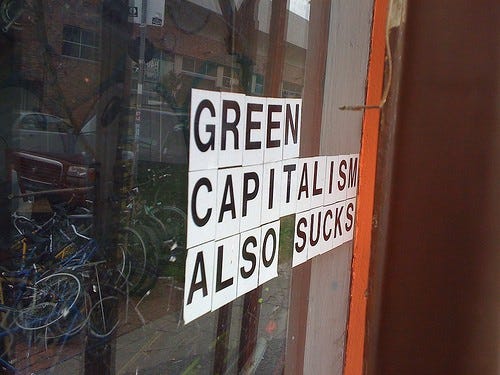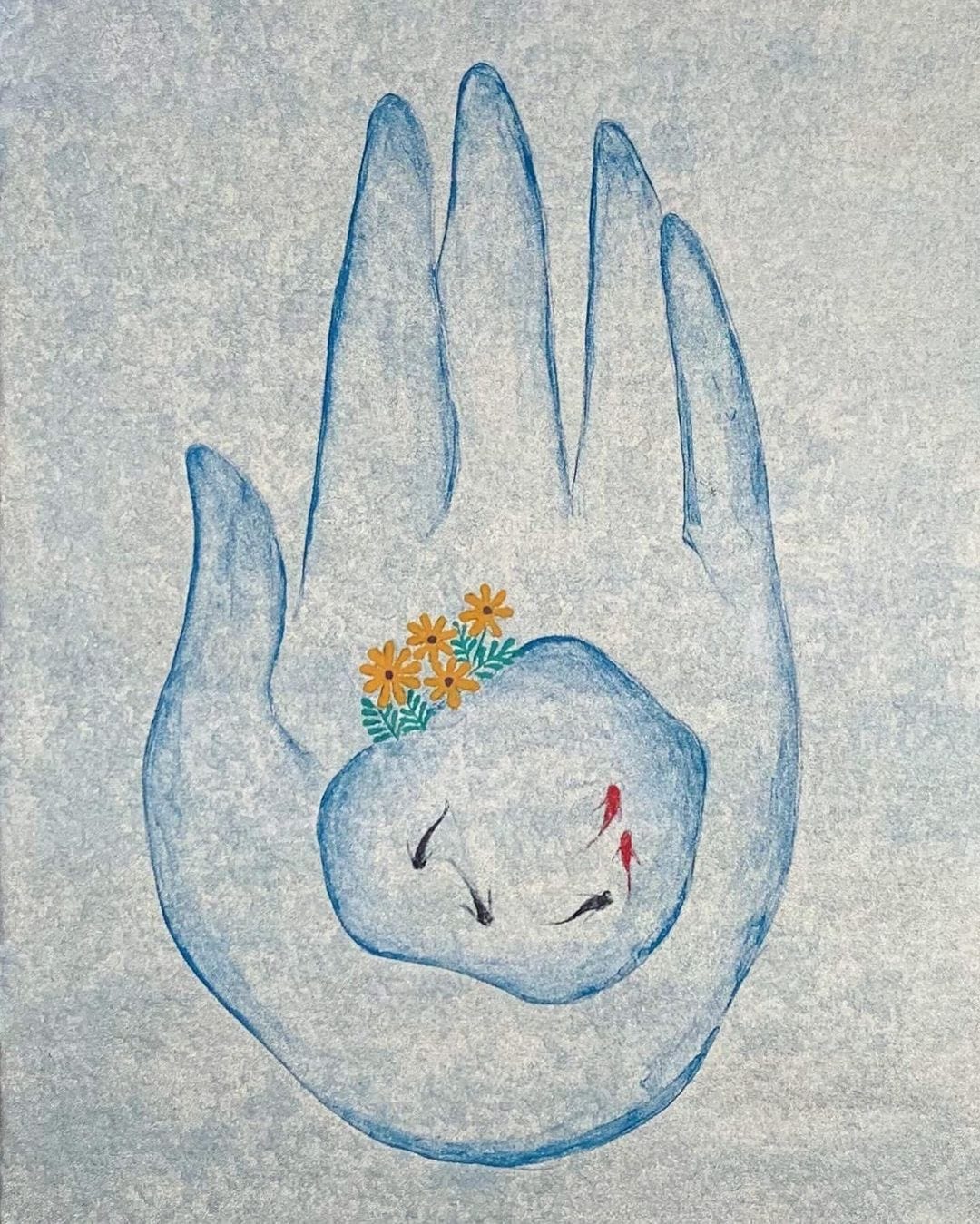Not long ago, I was in a huge building (one of those that boast their LEED certification while blasting air conditioning at full power), in one of those cold, brightly lit rooms in Mexico City, surrounded by people who, like me, worked in “sustainability.”
And I say “sustainability” in quotes because, to be honest, it’s getting harder for me to say that’s what I do without a hint of skepticism (which, to be fair, happens to me with many things).
As I saw the word printed on labels, projected in presentations, and spoken in speeches as some kind of saving promise, I had a sort of out-of-body experience. Not in a mystical sense, but more like my brain decided to take a break from the collective farce we were performing.
Have you ever seen yourself from above? Have you ever felt outside your body,heard yourself speak, observed those around you, and been surprised?
That’s how I felt that day.
My discomfort reached its peak when I heard (once again) the phrase “responsible consumption” and then, as if that wasn’t enough, “green capitalism.”
All the blood drained from my face.
Why did I feel so uncomfortable? Because I realized that sustainability has become a convenient mirror: it reflects the image we want to see, not the one we need to face.
Sustainability without systemic change: a contradiction
The other day, some friends asked me (because, of course, I’m “the sustainability person”):
- What do you think about electric cars?
and then
- What about recycled plastic?
And honestly, I wish I could give simple answers, but I can’t.
It’s like being asked if you’d rather break an arm or a leg: neither option is particularly appealing if we don’t question why we have to break something in the first place.
The problem is not whether an electric car is better than a gasoline one. The problem is that we still see the ecological crisis as a series of technical problems that can be solved with better products, instead of recognizing that it is a philosophical, relational, and systemic crisis.
If sustainability remains surface-level, it doesn’t touch the root of the problem.
The ecological crisis is not just a technical issue of emissions or waste; it is a crisis of philosophy, relationships, and imagination.
It is not possible to sustain the unsustainable, and without a deep shift in how we relate to the world, “sustainability” will remain just another patch on a system that needs to be transformed from its foundations.
Silvia Federici reminds us that capitalism was built on land expropriation, body exploitation, and ecosystem destruction. The question that haunts me when I acknowledge this , and that I invite you to consider now, is both simple and profound:
Do we really want to sustain this?
The origins of a concept in crisis
Before I go on, I think it’s important to pause for a moment and examine where this word that we see everywhere actually comes from. Because, did you know that the “sustainability” we know today has a much more pragmatic and limited origin than we imagine?
The term “sustainable” was born in 18th-century German forestry. Nachhaltige referred specifically to a forest management practice: not cutting down more trees than the forest could regenerate. Simple, concrete, measurable. Nothing about saving the world, nothing about revolutionizing the economic system. Just a practical rule to avoid running out of wood.
Two centuries later, in 1987, the Brundtland Report popularized the concept of “sustainable development,” defining it as that which “meets the needs of the present without compromising the ability of future generations to meet their own needs.” Suddenly, that modest idea of forest management became a global aspiration.
Under this definition, development is assumed to be equivalent to economic growth, different cultural conceptions of needs and the future are ignored, and—worse yet—no one questions who gets to define which needs are legitimate and for whom.
We have created a fundamental contradiction: we are trying to make “sustainable” a system that, by design, requires infinite growth.
The paradox of modern sustainability
Sustainability, as we see it today, is deeply paradoxical.
Think about it: we talk about balance within a system built on infinite—and therefore impossible—exploitation of resources.
“We can keep consuming... but responsibly!”
Is this the truth, or just a comforting narrative that allows us to avoid guilt without questioning the structures that brought us here?
In its process of trivialization, sustainability has become a marketing strategy; just another label within the machinery of consumption.
The green simulacrum: an empty term or a necessary illusion?
French philosopher Jean Baudrillard wrote that we live in an era of hyperreality, where signs no longer refer to realities but to created images. That’s exactly what seems to have happened with sustainability: it has become a simulacrum.
We are sold the idea that we can keep extracting, producing, and consuming, so long as we do it “sustainably.”
Donna Haraway reminds us, in her beautiful work on the Chthulucene, that there is no “clean and orderly” future we can aspire to without first confronting the complexities of the planetary crisis.
Clinging to the idea of sustainability as something that will allow us to continue with the current model without consequences is, at best, naïve and, at worst, a dangerous distraction.
The myth of Green Capitalism
Ah, “green capitalism”; a contradiction in itself.
Capitalism needs perpetual growth; ecology, on the other hand, teaches us that living systems depend on balance and regeneration, not infinite growth.
The idea of a “sustainable / green / eco-friendly capitalism / [insert other contradiction here]” is nothing more than a strategy to maintain the same power structures with a fresh coat of green paint.
Let's analyze, for example, the "green" tech industry: Tech giants proclaim themselves "carbon neutral" while producing millions of devices designed for obsolescence.
They boast about data centers powered by renewable energy, yet they continue extracting minerals under exploitative conditions, designing products that are impossible to repair, and generating mountains of electronic waste that end up in landfills in the Global South.
Truly sustainable technology would require durable, repairable, and upgradeable devices - the exact opposite of the current business model.
And of course, "sustainable" fashion: Corporations that produce millions of garments per year now have "eco-friendly" lines (while continuing to produce millions of garments at an accelerated pace, maintaining precarious working conditions, and generating massive pollution).
The solution? Keep buying their clothes, but now made from "recycled materials." Because, of course, overconsumption was never the problem, right?
Green capitalism" does not change extractivist logics; it merely shifts them to new frontiers, new territories, new bodies.
In each of these cases, we see the same pattern: superficial solutions that keep the system of infinite growth, labor exploitation, and ecological destruction intact.
We need to change the idea that well-being means production and consumption.
And that, evidently, is not a very profitable business.
We need a radical transformation of our systems of production, consumption, and distribution—something that capitalism, even in its "greenest" version, cannot offer without undermining its own foundations.
Dismantling the myth, remembering the path
In my work as a consultant, I increasingly find myself questioning not only the solutions we propose but also the very questions we ask: What if, instead of asking how to make the current system of production and consumption sustainable, we asked how to cultivate systems that regenerate life?
The answers aren't found in corporate sustainability reports or international climate agreements alone. They're in the milpas that still safeguard the genetic diversity of maize, in the communal governance systems that have preserved forests for generations, in the practices of traditional midwives who understand the cycles of life and death.
And when clients ask:
"show me concrete, easy solutions, for today, so the company can keep growing..."
I no longer give those answers.
Not because I don't want to, but because, quite simply, they do not exist.
What exists instead is an invitation to deeper work.
Because what we need is not a manual of quick fixes, but the courage to inhabit uncertainty, to listen to other ways of knowing, and to commit to a transformation that, rather than comfortable, is alive.
So, what now?
What do we do with sustainability?
Do we discard it altogether?
Not necessarily. But we do need to push it out of its comfort zone, and more importantly, we need to take concrete steps toward transformation.
First, we need to reconnect with traditional ecological knowledge.
In Maya communities, there is no exact word for "sustainability." The closest term would be k'anan k'áax, which translates to "caring for the forest/jungle"—a reciprocal relationship in which the forest/jungle also takes care of us. This isn't just a linguistic curiosity; it's a blueprint for action.
This doesn’t mean that technological advancements have no role to play. Innovations in regenerative agriculture, decentralized energy systems, and biomimicry-inspired design should complement traditional ecological wisdom rather than replace it. The key is integrating these approaches in ways that respect ecological limits and social justice, rather than using technology as a way to avoid deeper systemic changes.
Second, we must actively resist the commodification of sustainability:
Question "sustainable" product lines and ask about their full supply chain
Support repair economies and local craftspeople
Join or create community gardens and food forests
Advocate for policy changes that prioritize regeneration over growth
Reject "sustainable" consumption that only perpetuates the same extractive models
Support worker-owned cooperatives that prioritize ecological health over profit
Challenge companies' claims about carbon neutrality and demand transparency
Develop local circular economy initiatives that eliminate waste
Build networks for resource sharing and mutual aid
And don’t forget that:
While we debate ESG frameworks in air-conditioned offices - there are communities preserving seeds and knowledge.
While companies roll out "sustainable" product lines - Indigenous peoples continue to protect sacred territories under constant threat from the same economic systems that claim to champion sustainability.
While sustainability consultants create presentations, - grassroots movements defend water sources.
While businesses measure their "green" metrics, - local communities rebuild food sovereignty.
While organizations pursue certifications, - earth defenders risk their lives protecting forests.
While companies market "eco-friendly" solutions, - Indigenous women preserve medicinal knowledge.
Moving from critique to embodied change
That day in the boardroom, when I felt my mind detach from my body, something else was actually happening: my intuition was pulling me toward another horizon, showing me the urgency of looking beyond the simulacrum.
True sustainability is uncomfortable because it demands we return to our bodies, to the earth, to the complex web of relationships that make life possible.
It requires more than change or transformation—it requires remembering what it means to be human in relationship with the more-than-human world.
And yes, it also means letting go of many of the comforts and certainties we have clung to. But I believe that in that release, in that willingness to be transformed, we will find the answers we truly need.
What is at stake is not just the "sustainability" of a business model but our capacity to imagine and create worlds beyond the extractive logic of capitalism.
The path forward isn't about sustaining what's broken—it's about nurturing what helps life thrive, about remembering what Mayan communities never forgot: that the Earth is not a resource to be exploited, but a living being with which we coexist.
I honestly think it starts with questioning our own relationship to sustainability—where do we still uphold illusions of "responsible consumption" that simply feed back into the same broken system?
Maybe it’s about deepening our understanding of regenerative practices, supporting initiatives that prioritize ecological and social repair over corporate greenwashing.
Or maybe it’s about something even simpler yet powerful: talking about this.
Bring these conversations into your spaces, make them mainstream, invite more people to sit with the discomfort and ask the hard questions.
“Caring about the world” shouldn’t be a quirk,a personality trait, but a political conversation we should all focus on.
Join this conversation and movement, not as consumers seeking "sustainable" products, but as beings capable of reciprocal relationships with the living world.
Each action that prioritizes life over profit is a step toward the world we know is possible.
This could look like this:
Learn herbalism: An act of resistance against the industrialization of health, particularly the dominance of Big Pharma. By learning to use medicinal plants, we reclaim control over our health, breaking free from the global pharmaceutical systems that prioritize profit over well-being and collective health.
Synchronize with your hormonal cycles: Understanding and honoring hormonal cycles directly challenges the capitalist logic of linear productivity. Recognizing that we have different energies and capacities allows us to resist the expectation of constant output.
Consume more plants, fewer animals: This is not just an ethical choice, it’s a transformative act. By shifting to plant-based eating, we push for a food system that values life, reduces exploitation, and regenerates ecosystems rather than degrading them.
Mutual aid networks: Creating systems for exchanging skills, tools, and resources in your community is a powerful antidote to the individualism and scarcity-driven mindset of capitalism.
Participate in strategic boycotts: Boycotts, when organized collectively and sustained over time, can be powerful tools for systemic transformation.
Restore local ecosystems: Engaging in activities like wetland restoration, native reforestation, or creating pollinator gardens are more than acts of conservation, they are direct challenges to the ongoing destruction of our planet's ecosystems.
Decolonize knowledge by learning from traditional knowledge keepers: Supporting and learning from traditional knowledge preserves ancestral wisdom that colonialism has sought to erase, strengthening practices of care and cultivation that respect the environment.
Transform organizations from within: If you work in a conventional organization, you can catalyze change by introducing alternative success metrics beyond economic growth. Proposing social and ecological impact assessments, work policies that respect natural cycles, or environmental justice initiatives can transform entire organizational cultures.
So let me ask this again:
Do we really want to sustain this system of extraction and disconnection?
Or are we ready to create something entirely new?











Thank you for this perspective into the "behind the scenes" of sustainability work. I do admire the attempt to provide people with more ethical options within the current social/economic framework but the thing that bothers me is at the end of the day, we are still incentivized to continue participating in the current model of exploitation (and that is when we are given a choice at all). Only by removing the systems that put people in these kinds of conundrums in the first place (and, probably, by learning to live with less) are we going to see any real change.
Absolutely could not agree more. I also worked in the "sustainability" world and often felt this same discomfort. I am also reveling through Mexico now and have found a lot of inspiration in Mayan philosophy (and milpas). Have you heard of the degrowth movement? I think you would really connect with their philosophy :)